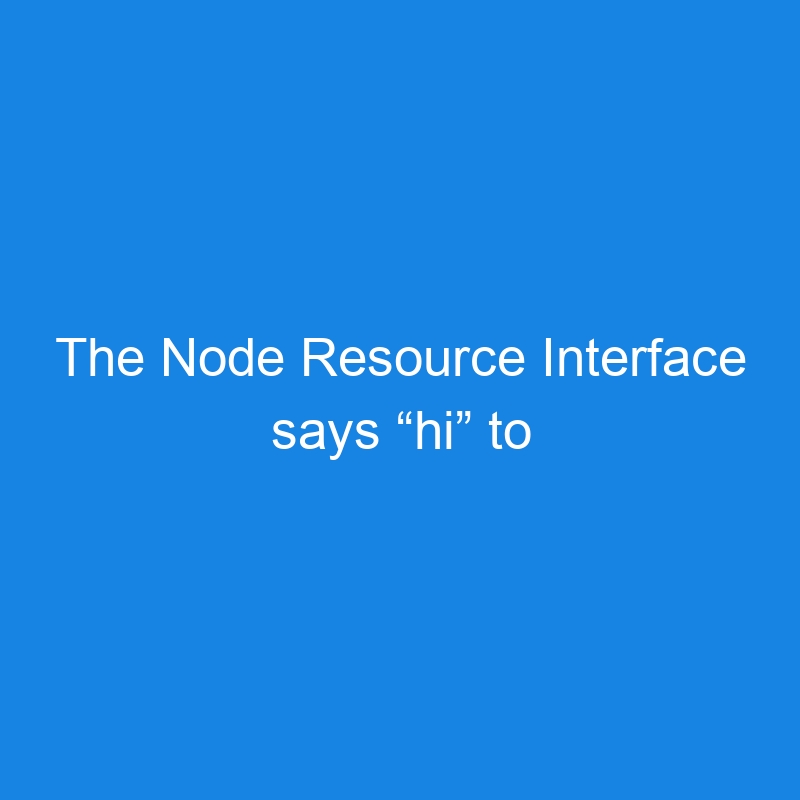Community blog post by Sascha Grunert, CRI-O maintainer
The Node Resource Interface (NRI) allows users to write plugins for Open Container Initiative (OCI) compatible runtimes like CRI-O and containerd. These plugins are capable of making controlled changes to containers at dedicated points in their life cycle. For example, by using the NRI it is possible to allocate extra node resources on container creation, which can be released again after the container got removed.
A plugin is written as daemon-like process which serves a predefined API based on ttRPC (gRPC for low-memory environments). This means in detail, that the NRI implementation in the runtime (CRI-O, containerd) will communicate using a UNIX Domain Socket (UDS) with each plugin and provide them with all required event data. For example, events can be container or pod sandbox creation, stopping or removal, while corresponding data are the name, namespace or corresponding annotations.
On one hand plugins written as daemons have the benefit of persisting the current state out of the box, while on the other hand they come with a performance and management overhead. For that reason, the NRI also supports OCI hook-like binary plugins which get executed for each event. Combining the concept of small binary plugins with a universal standard like WebAssembly (Wasm) empowers the NRI to run on the edge and universally on all imaginable platforms.
How it works
The required change for the NRI landed with Pull Request containerd/nri#121. This change adds a go-plugin mechanism to the NRI. Each plugin gets compiled to Wasm, which means that it is size-efficient, memory-safe, automatically sandboxed and highly portable out of the box! The plugin system works in the same way as the NRI by using Protocol Buffers. This means, that the NRI can reuse the existing API for ttRPC, while the communication will happen in memory and not over the Remote Procedure Call (RPC).
One key benefit is that WebAssembly is designed as a portable compilation target for programming languages. Plugins compiled to Wasm can be used anywhere, which means that there is no requirement for multi architecture binaries. Beside that, the Wasm stack machine is designed to be encoded in a size and time efficient binary format, which make them great targets for binary execution.
Demo
Unfortunately, the native golang (go) compiler does not have full WebAssembly support yet, which means the plugins have to be compiled using the alternative tinygo compiler. An example Wasm plugin within the NRI repository, can be compiled locally using:
make $(pwd)/build/bin/wasmOr within a container image:
make $(pwd)/build/bin/wasm TINYGO_DOCKER=1In the future it may be possible to cross compile plugins using GOOS=wasip1 GOARCH=wasm go build, but that is not implemented yet (see knqyf263/go-plugin#58).
The resulting file should be a valid WebAssembly binary:
file build/bin/wasmbuild/bin/wasm: WebAssembly (wasm) binary module version 0x1 (MVP)
To try out the binary, we have to put it into the default local NRI directory. We also need to prefix the binary by a chosen index, which later refers to the plugin execution order:
sudo mkdir -p /opt/nri/plugins
sudo cp build/bin/wasm /opt/nri/plugins/10-wasmCRI-O v1.32 (which has been not released yet as time of writing) or it’s recent main branch can be used to verify that the plugin got loaded successfully:
sudo ./bin/crio…
INFO[…] Create NRI interface
INFO[…] runtime interface created
INFO[…] Registered domain "k8s.io" with NRI
INFO[…] runtime interface starting up...
INFO[…] starting plugins...
INFO[…] discovered plugin 10-wasm
INFO[…] starting pre-installed NRI plugin "wasm"...
INFO[…] Found WASM plugin: /opt/nri/plugins/10-wasm
INFO[…] WASM: Got configure request
INFO[…] Synchronizing NRI (plugin) with current runtime state
INFO[…] synchronizing plugin 10-wasm
INFO[…] WASM: Got synchronize request
INFO[…] pre-installed NRI plugin "10-wasm" synchronization success
INFO[…] plugin invocation order
INFO[…] #1: "10-wasm" (external:10-wasm[0])
…
The partial logs above outline that the 10-wasm plugin got loaded and the WebAssembly plugin received a configure and synchronize request. Log lines prefixed with WASM: are directly invoked from the plugin itself:
func (p *plugin) Configure(ctx context.Context, req *api.ConfigureRequest) (*api.ConfigureResponse, error) {
log(ctx, "Got configure request")
return nil, nil
}The logging itself is achieved by a so-called host function. This function can be used to pass data back to the host (the NRI) and process them there (log to stderr). The plugin just has to fulfill the host log function:
func log(ctx context.Context, msg string) {
api.NewHostFunctions().Log(ctx, &api.LogRequest{
Msg: "WASM: " + msg,
Level: api.LogRequest_LEVEL_INFO,
})
}And the NRI can fulfill the logging functionality:
func (wasmHostFunctions) Log(ctx context.Context, request *api.LogRequest) (*api.Empty, error) {
switch request.GetLevel() {
case api.LogRequest_LEVEL_INFO:
log.Infof(ctx, request.GetMsg())
case api.LogRequest_LEVEL_WARN:
log.Warnf(ctx, request.GetMsg())
case api.LogRequest_LEVEL_ERROR:
log.Errorf(ctx, request.GetMsg())
default:
log.Debugf(ctx, request.GetMsg())
}
return &api.Empty{}, nil
}If the plugin is loaded into memory and CRI-O now creates an example sandbox, then the WebAssembly instance will get executed accordingly by invoking the correct entry point:
sudo crictl runp test/testdata/sandbox_config.json…
INFO[…] Running pod sandbox: test.crio/podsandbox1/POD id=…
…
INFO[…] WASM: Got state change request with event: RUN_POD_SANDBOX
INFO[…] WASM: Got run pod sandbox request
…
INFO[…] Ran pod sandbox … with infra container: test.crio/podsandbox1/POD id=…
…
WebAssembly NRI plugins allow to distribute functionality independently from the target platform in a secure and performant way. That makes them awesome for edge scenarios or for being distributed as OCI artifacts. For the future, it is imaginable to have a (semi) automatic reload functionality for the loaded in-memory plugins, but that is something we are currently elaborating.
Thank you for reading this blog post! If you have any questions or comments feel free to open an issue in the NRI repository.
